Olympics transgender policy approved
The International Olympic Committee approves a policy for post-operative transsexuals to compete in women’s events, expecting this to be extremely rare, as Dr Emma Hilton explains in this talk.
The UK’s Supreme Court has ruled that “man”, “woman” and “sex” in the Equality Act 2010 refer to sex, not self-ID or paperwork (gender-recognition certificates). This agreed with our legal interpretation. We have published new guidance and are in the process of updating our publications to reflect the judgment. We are also working to provide answers to the questions we're hearing from supporters and the media. We will publish these as soon as possible.

A timeline on transgender policies in sport showing the decisions of sports governing bodies that affect male inclusion in women’s sport.
Also see our Sports policies page for an update on which sports have restored fairness for women and girls.
2003
The International Olympic Committee approves a policy for post-operative transsexuals to compete in women’s events, expecting this to be extremely rare, as Dr Emma Hilton explains in this talk.
2013

The UK Sports Councils Equality Group publishes its first-ever guidance for transgender inclusion in female events based on testosterone suppression. This is widely adopted by UK sports bodies despite no processes for monitoring compliance – hence in practice largely a self-ID policy.
2015

The International Olympic Committee consults a trans-identifying male runner, Joanna Harper, and amends its policy to require only 12 months of testosterone suppression below 10nmol (the typical female range is around 1nmol). Listen to Joanna Harper talk about being involved in changing the policy.
2018

Fair Play For Women starts raising concerns with UK and international sports federations.
2019

Sharron Davies MBE and Fair Play For Women send a letter to the International Olympic Committee signed by 60 Olympians asking for a review of the 2015 testosterone suppression policy, to restore fairness for female competitors. There is no reply.
February 2020

World Rugby holds a workshop to determine its transgender policy, with full transparency and speakers from all sides including Dr Nicola Williams and Dr Emma Hilton.
March 2020

The UK Sports Councils Equality Group commissions new guidance on transgender inclusion in female sport.
October 2020

World Rugby announces its new policy: for female safety, no males will be permitted to play women’s international matches. National federations do not adopt the policy.
April 2021
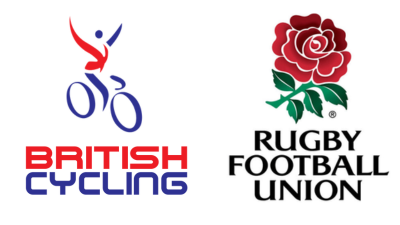
British Cycling and the Rugby Football Union run consultations on transgender policy, but no results are published. The RFU’s approach is a case-by-case assessment, but there is no detail on how this will work.
July 2021
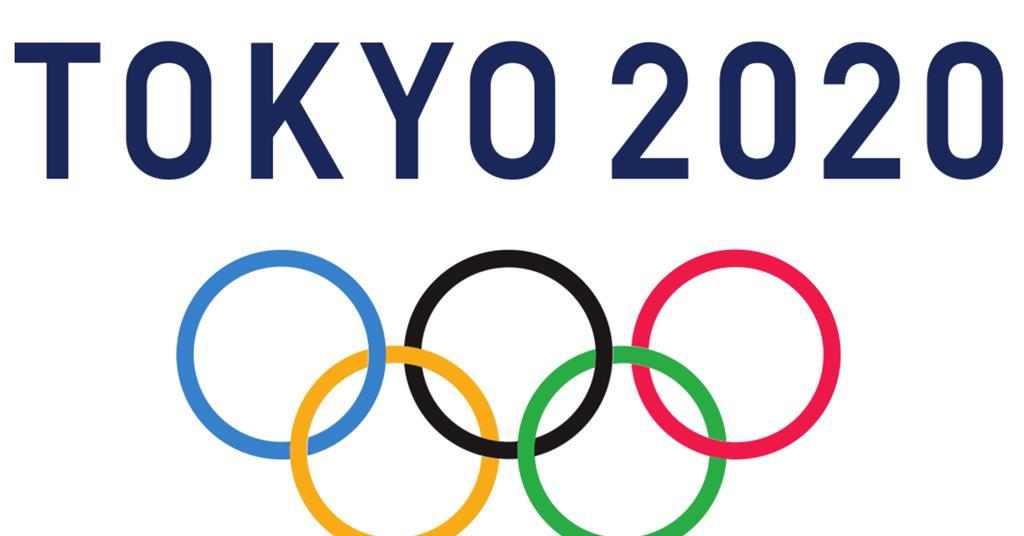
There are three male-born competitors in women’s teams at the Tokyo Olympics, including weightlifter Laurel Hubbard, who featured in the medalists’ press conference despite not winning a medal. Trans-identifying and “non-binary” females also compete in women’s teams.
September 2021

New Sports Councils Equality Group guidance is published: trans (male) inclusion in female category is incompatible with fairness and in some cases safety for females. Sport governing bodies must choose.
November 2021

Widely mocked new IOC guidance abandons testosterone suppression, says there should be “no presumed advantage” and tells sports to make their own rules.
February 2022
Trans-identifying male swimmer Lia Thomas wins and sets new records in women’s events at the Ivy League Championship and the NCAA championship in the USA. A trans-identifying female swims in the same event, in the women’s competition. Listen to the crowd in this race, dominated by Thomas.
March 2022
Trans-identifying male cyclist Emily Bridges is stopped from racing to qualify for the Commonwealth Games in the Wales women’s team by opposition from female cyclists.
April 2022
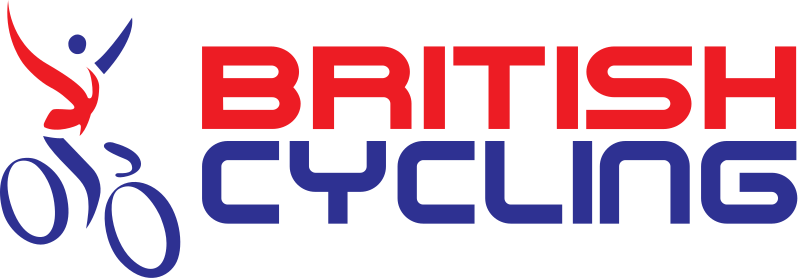
British Cycling withdraws its transgender inclusion policy, consults with its international federation, Union Cycliste Internationale, and declares Bridges ineligible.
June 2022

British Triathlon announces a new policy re-establishing the female category for those born female.
The UK government minister responsible for sport hosts a round-table meeting of sport chief executives asking for policies that restore the female category.
June 2022

The international swimming federation, FINA, also known as World Aquatics, announces a new policy excluding anyone who has been through male puberty from female competition.
July 2022

Rugby Football Union (governing rugby union in England) and Rugby Football League (governing rugby league in England) adopt a revised policy following their international federations, restricting female full-contact rugby to those born female. A trans-identifying male player threatens a legal challenge.
August 2022
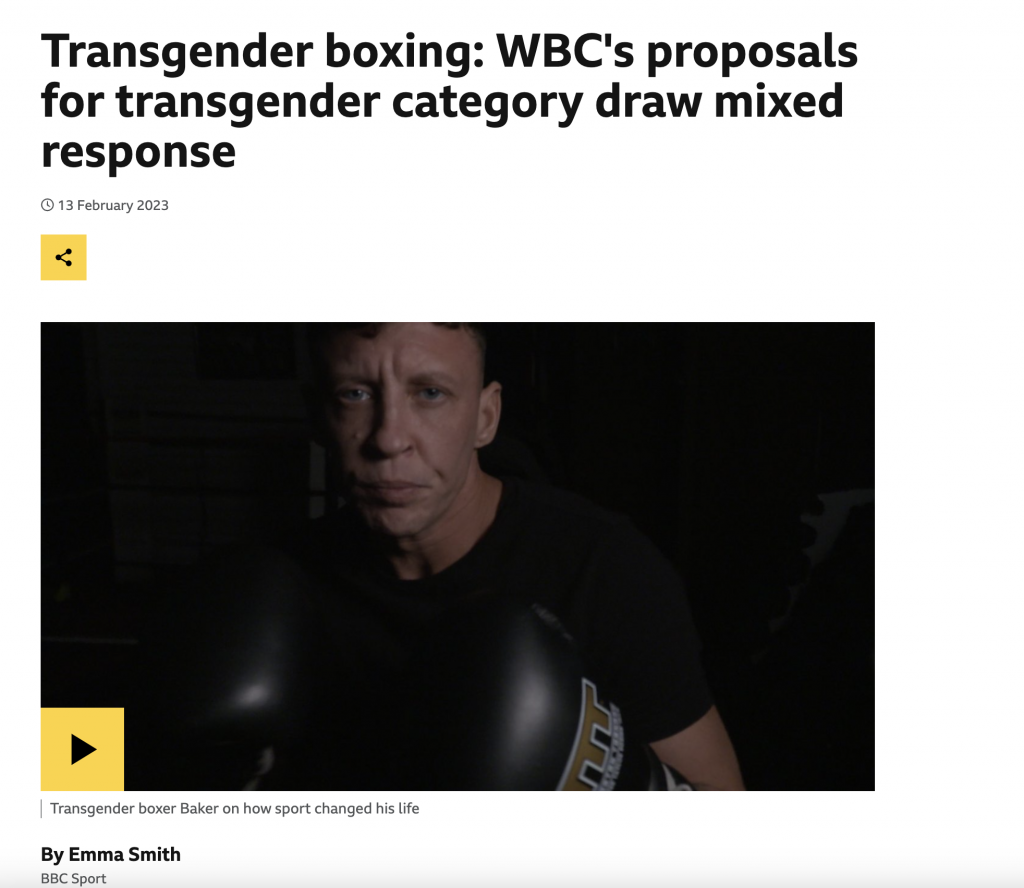
World Triathlon announces a revised policy based on two years of testosterone suppression and a requirement not to have competed in men’s events for four years.
The World Boxing Council announces that its policy will remain sex-based for safety.
After lengthy review processes, the Irish RFU and Welsh Rugby Union adopt sex-based policies to match the Rugby Football Union and Rugby Football League.
August 2022

Volleyball England introduces a transgender policy acknowledging that “safety and fairness cannot be reconciled with self-identification in the female category” and therefore excluding trans-identifying men from competing in the women’s category.
2023
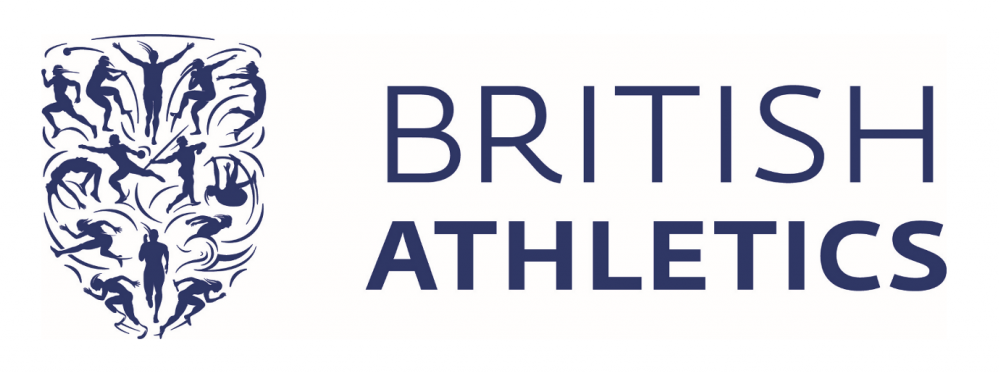
In response to proposals from World Athletics, UK Athletics states that testosterone suppression does not work and calls for clarity in UK law. The Equality and Human Rights Commission responds with a statement that it is lawful to exclude all males, even those with a gender-recognition certificate, from female sport.
March 2023

In a surprise announcement, World Athletics announces that female events will be open only to those born female, with effect from 31st March.
UK Athletics announces that it will adopt the World Athletics policy with immediate effect.
March 2023

The British Karate Federation restricts women’s competitions to those born female.
April 2023

Swim England adopts a sex-based policy for all licensed competitions. Other UK swimming federations adopt the same policy.
May 2023

British Cycling adopts open and female categories for all competitions from the end of 2023. But “women-only” Breeze rides – designed to encourage more women to cycle for fun – will still include “transgender women and non-binary people”.
July 2023

The world cycling federation, Union Cycliste Internationale, adopts open and female categories, coming into line with the other big Olympic sports – athletics and swimming.
August 2023

British Rowing announces that its female category will be restricted to those “assigned female at birth”, alongside an open category, from 11th September 2023.
August 2023
October 2023

A row breaks out in a Sheffield women’s football league after a female player is seriously injured, prompting much media coverage but no action from the Football Association.
November 2023
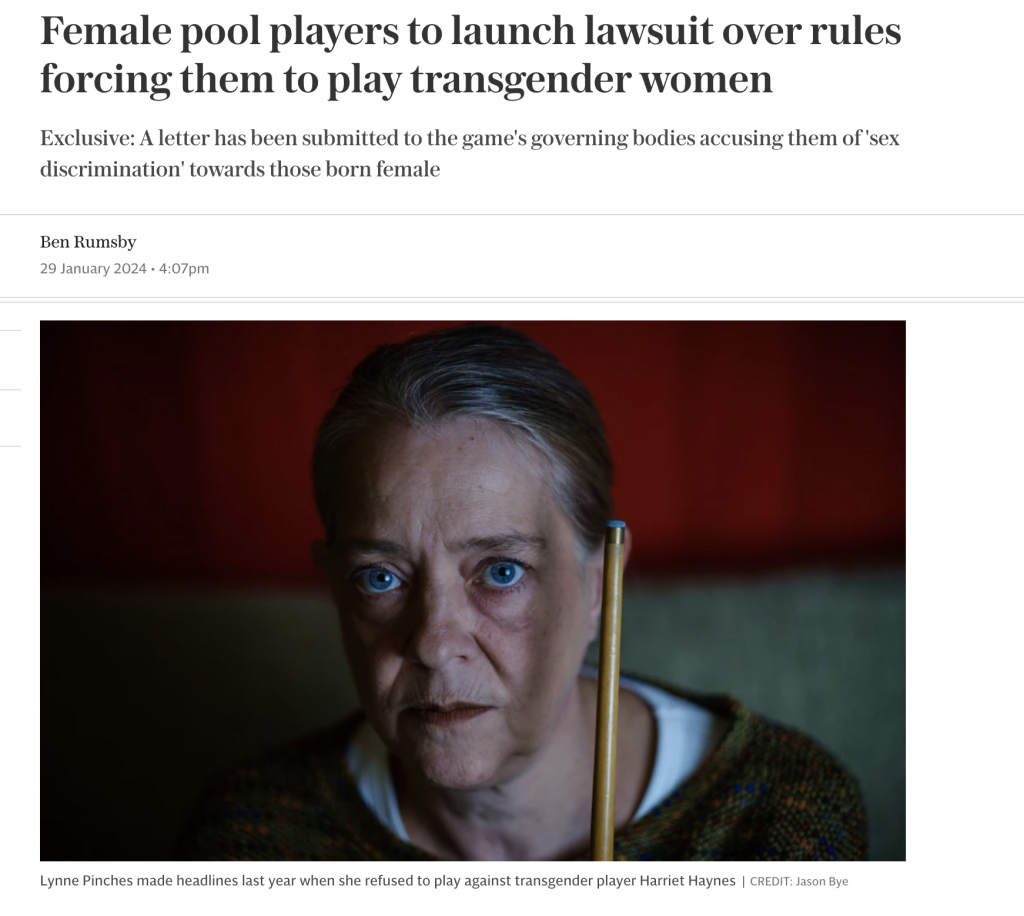
A group of female pool players in the UK launches a legal action against pool authorities to reinstate the protected female category in women’s pool tournaments.
November 2023

The International Cricket Council (ICC) announces new gender eligibility regulations, protecting the women’s game.
November 2023

England’s Angling Trust announces that the women’s shore-angling team will in future have only women in it. The story of how the women of the England team took a stand unfolded in the Mail on Sunday, starting in June with more in September and then a policy change at the international governing body.
December 2023
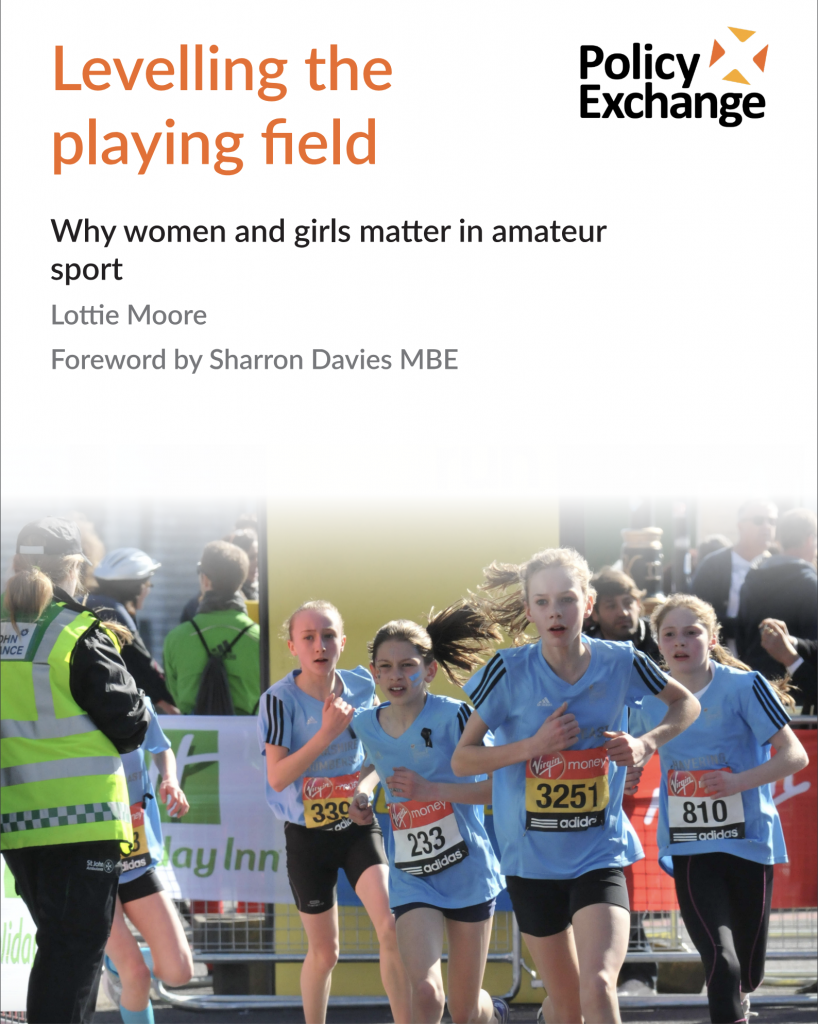
British Judo adopts a revised policy in which only those born female are eligible for women’s events, without publicity.
A report from think-tank Policy Exchange makes the case for a protected female category in sport.
January 2024
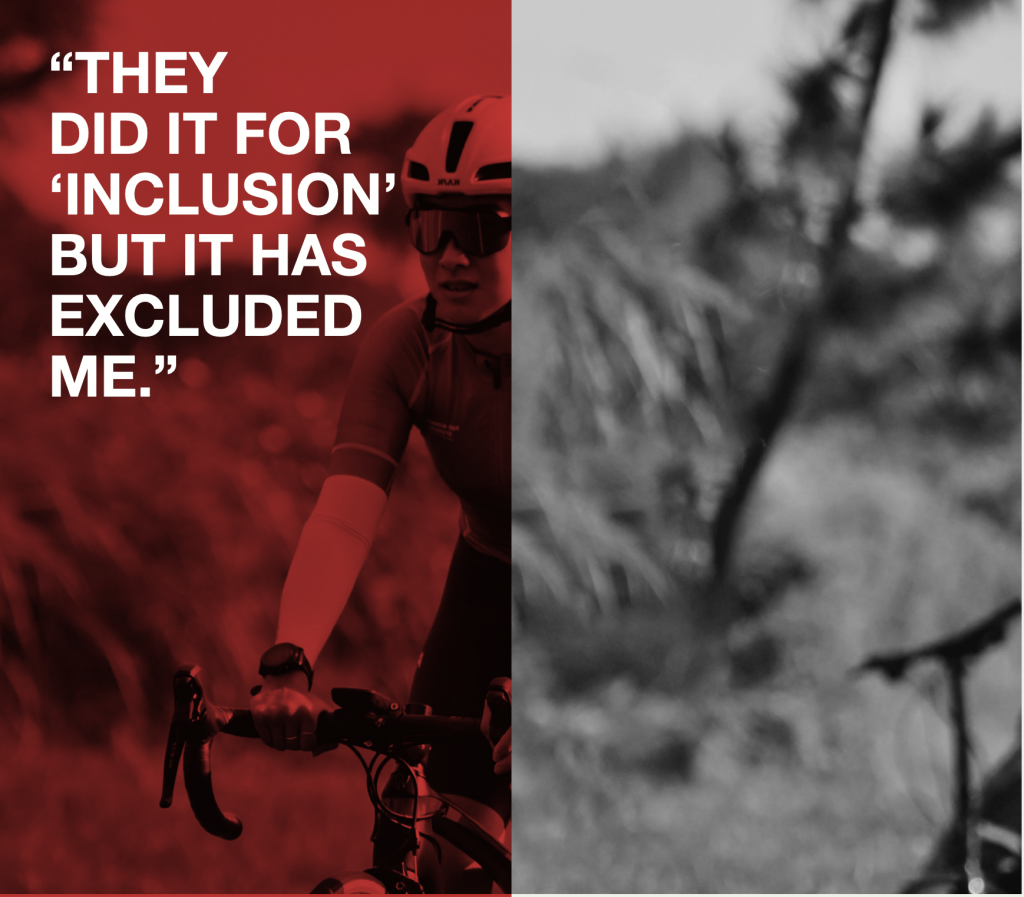
A new report from Fair Play For Women shows how “inclusion” in sport is harming women and girls in the UK, with personal testimonies from 25 sports.
March 2024
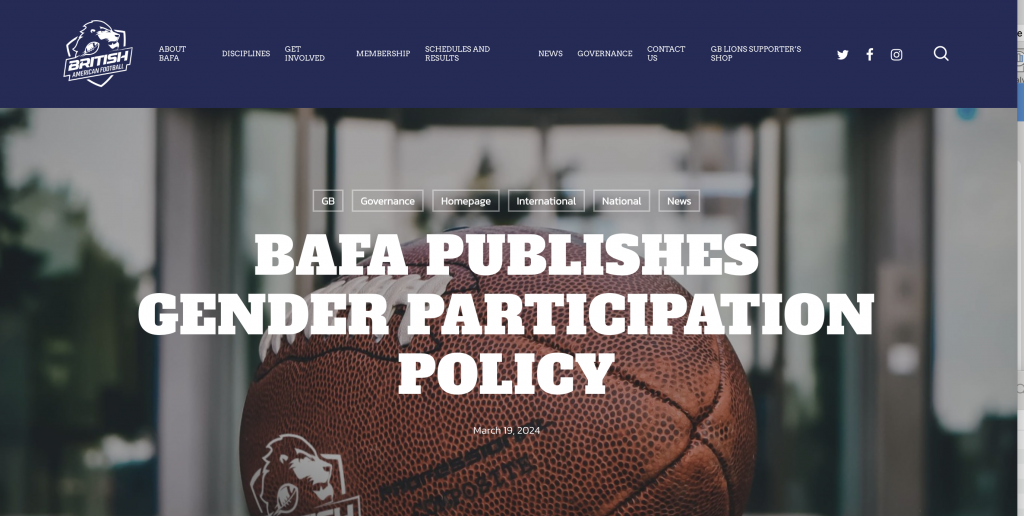
The British American Football quietly introduces a revised policy to protect female players.
A new paper by 26 academics, The International Olympic Committee framework on fairness, inclusion and nondiscrimination on the basis of gender identity and sex variations does not protect fairness for female athletes, points out the flaws in the IOC’s November 2021 statement.
February 2024
Male-born rider Emily Bridges threatens to take British Cycling to the European Court of Human Rights. Watch Sex Matters’ Fiona McAnena discussing the case on Free Speech Nation.
April 2024
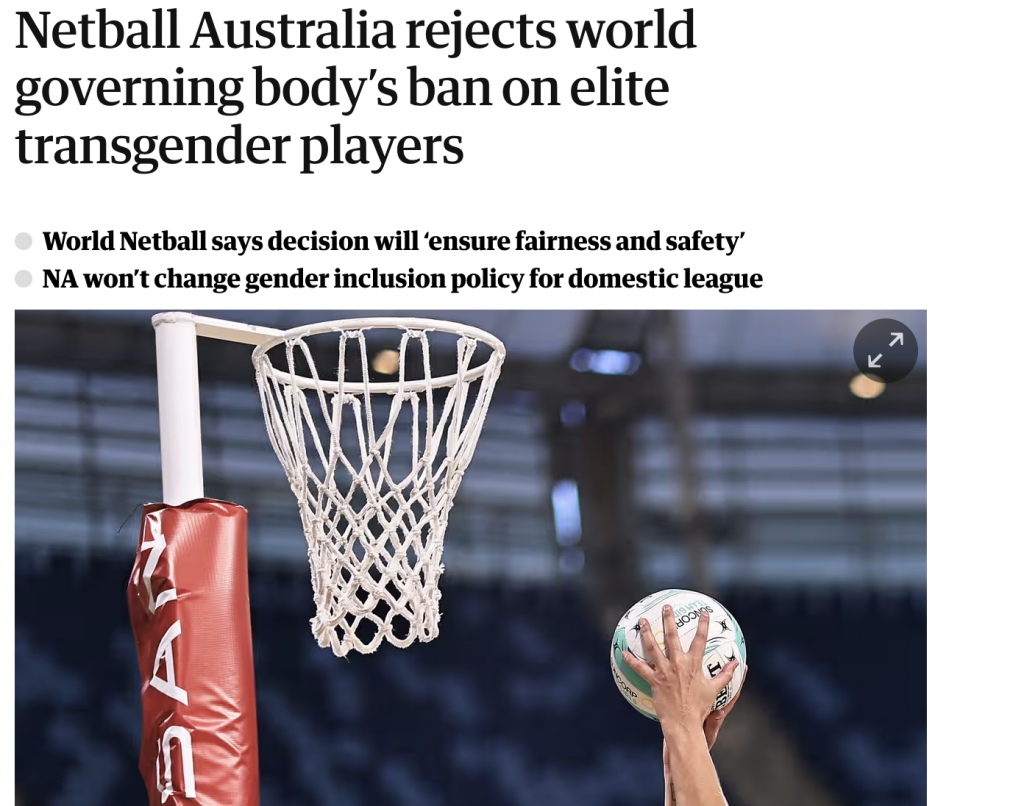
After a years-long review process, World Netball announces it will restrict women’s teams to those born female, regardless of identity. But the policy is instantly rejected by Netball Australia, the biggest netball country.
May 2024

A new policy restricts participation in women’s events to those who have not gone through male puberty.
September 2024

In September 2024 another UK sport protects the female category with a revised policy.
October 2024

The England and Wales Cricket Board is forced to align the top end of cricket with the International Cricket Council’s policy, which restricts women’s teams to those born female, but decides that at the domestic level “individuals are accepted in the gender they identify as”.
December 2024

Hailey Davidson, a male college golfer, is one stroke away from the women’s pro tour when the LPGA changes its policy to exclude anyone who has gone through male puberty.
December 2024

After three years’ deliberation, the LTA declares that tennis is a gender-affected sport and that “specified” competitions, anything between clubs and higher level, must be fair for female players. Clubs have discretion to follow this principle for their own events. The LTA’s shocking changing-rooms policy has also been replaced with a sex-based policy based on the EHRC guidance.
January 2025

England Hockey updates its policy, acknowledging that hockey is a gender-affected sport and so to secure fair competition its Trans and Non-Binary Participation Policy should restrict trans participation.
January 2025

England Golf, Scottish Golf and Wales Golf announces that women’s scratch golf tournaments will be female only, while anyone may register as female and obtain a “female” handicap for all other events.
January 2025

World Triathlon’s new policy adopts open and female categories, but allows trans-identifying males into elite female events after four years of testosterone suppression.
February 2025

The RYA adopts World Sailing policy for its events but tells clubs and classes, which organise the majority of races, to make their own rules and to favour “inclusion”(unfairness) for women. Changing room guidance says: “As a starting point, people who are trans or non-binary should be able to use the toilets, showers and changing facilities of their choice.”
March 2025

Ice Hockey UK announces that its female category will be restricted to those whose sex at birth was female.
March 2025
88% of delegates at the World Rowing Congress vote to restrict eligibility for women’s events to those registered female at birth.
April 2025

Ultimate Pool Group amends its rules to restrict women’s tournaments to those born female, ending a 15-month legal action brought by female players.
April 2025

The SFA announces that, from next season, only those born biologically female will be allowed to take part in competitive matches in the women’s game.
May 2025

On 1 May, the Football Association announces that from 1st June, trans-identifying male players would no longer be allowed to play in women’s teams. Registered male players were being contacted individually, with up to six counselling sessions on offer.
May 2025

Belatedly following its world body, England Netball announces that from next season, 1st September, only those female at birth can play in women’s netball.
May 2025

With immediate effect, the England and Wales Cricket Board has said, “all women’s matches are “only those whose biological sex is female will be eligible to play in women’s cricket and girls’ cricket matches”.
From 1 June, rowing in Scotland will follow the British and Welsh Rowing policy of Female and Open categories.
Sign up for timely updates on issues affecting everyday sex-based rights, our campaigns and events, as well as ways to get involved.